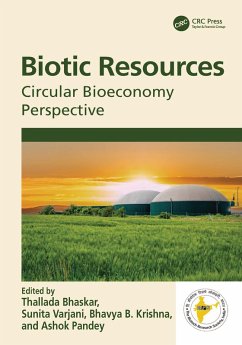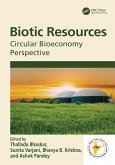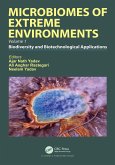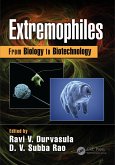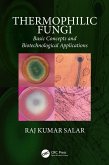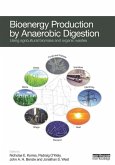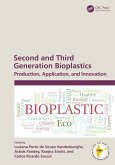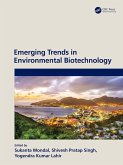Biotic Resources (eBook, ePUB)
Circular Bioeconomy Perspective
Redaktion: Bhaskar, Thallada; Pandey, Ashok; Krishna, Bhavya B; Varjani, Sunita
51,95 €
51,95 €
inkl. MwSt.
Sofort per Download lieferbar

26 °P sammeln
51,95 €
Als Download kaufen

51,95 €
inkl. MwSt.
Sofort per Download lieferbar

26 °P sammeln
Jetzt verschenken
Alle Infos zum eBook verschenken
51,95 €
inkl. MwSt.
Sofort per Download lieferbar
Alle Infos zum eBook verschenken

26 °P sammeln
Biotic Resources (eBook, ePUB)
Circular Bioeconomy Perspective
Redaktion: Bhaskar, Thallada; Pandey, Ashok; Krishna, Bhavya B; Varjani, Sunita
- Format: ePub
- Merkliste
- Auf die Merkliste
- Bewerten Bewerten
- Teilen
- Produkt teilen
- Produkterinnerung
- Produkterinnerung

Bitte loggen Sie sich zunächst in Ihr Kundenkonto ein oder registrieren Sie sich bei
bücher.de, um das eBook-Abo tolino select nutzen zu können.
Hier können Sie sich einloggen
Hier können Sie sich einloggen
Sie sind bereits eingeloggt. Klicken Sie auf 2. tolino select Abo, um fortzufahren.

Bitte loggen Sie sich zunächst in Ihr Kundenkonto ein oder registrieren Sie sich bei bücher.de, um das eBook-Abo tolino select nutzen zu können.
This reference book provides advanced knowledge on sustainable biogenic waste management. It covers innovative waste processing technologies to produce biofuels, energy products, and biochemicals.
- Geräte: eReader
- ohne Kopierschutz
- eBook Hilfe
- Größe: 4.85MB
Andere Kunden interessierten sich auch für
![Biotic Resources (eBook, PDF) Biotic Resources (eBook, PDF)]() Biotic Resources (eBook, PDF)51,95 €
Biotic Resources (eBook, PDF)51,95 €![Microbiomes of Extreme Environments (eBook, ePUB) Microbiomes of Extreme Environments (eBook, ePUB)]() Microbiomes of Extreme Environments (eBook, ePUB)72,95 €
Microbiomes of Extreme Environments (eBook, ePUB)72,95 €![Extremophiles (eBook, ePUB) Extremophiles (eBook, ePUB)]() Extremophiles (eBook, ePUB)52,95 €
Extremophiles (eBook, ePUB)52,95 €![Thermophilic Fungi (eBook, ePUB) Thermophilic Fungi (eBook, ePUB)]() Raj Kumar SalarThermophilic Fungi (eBook, ePUB)50,95 €
Raj Kumar SalarThermophilic Fungi (eBook, ePUB)50,95 €![Bioenergy Production by Anaerobic Digestion (eBook, ePUB) Bioenergy Production by Anaerobic Digestion (eBook, ePUB)]() Bioenergy Production by Anaerobic Digestion (eBook, ePUB)46,95 €
Bioenergy Production by Anaerobic Digestion (eBook, ePUB)46,95 €![Second and Third Generation Bioplastics (eBook, ePUB) Second and Third Generation Bioplastics (eBook, ePUB)]() Second and Third Generation Bioplastics (eBook, ePUB)51,95 €
Second and Third Generation Bioplastics (eBook, ePUB)51,95 €![Emerging Trends in Environmental Biotechnology (eBook, ePUB) Emerging Trends in Environmental Biotechnology (eBook, ePUB)]() Emerging Trends in Environmental Biotechnology (eBook, ePUB)53,95 €
Emerging Trends in Environmental Biotechnology (eBook, ePUB)53,95 €-
-
-
This reference book provides advanced knowledge on sustainable biogenic waste management. It covers innovative waste processing technologies to produce biofuels, energy products, and biochemicals.
Dieser Download kann aus rechtlichen Gründen nur mit Rechnungsadresse in A, B, BG, CY, CZ, D, DK, EW, E, FIN, F, GR, HR, H, IRL, I, LT, L, LR, M, NL, PL, P, R, S, SLO, SK ausgeliefert werden.
Produktdetails
- Produktdetails
- Verlag: Taylor & Francis eBooks
- Seitenzahl: 252
- Erscheinungstermin: 6. Februar 2023
- Englisch
- ISBN-13: 9781000832426
- Artikelnr.: 66655176
- Verlag: Taylor & Francis eBooks
- Seitenzahl: 252
- Erscheinungstermin: 6. Februar 2023
- Englisch
- ISBN-13: 9781000832426
- Artikelnr.: 66655176
- Herstellerkennzeichnung Die Herstellerinformationen sind derzeit nicht verfügbar.
Dr. Thallada Bhaskar is Senior Principal Scientist and Head, Material Resource Efficiency Division at the CSIR-Indian Institute of Petroleum, Dehradun, India. He completed his Ph.D. from Osmania University, Hyderabad, India. He carried out Postdoctoral Research at Okayama University, Okayama, Japan after which he worked there as Assistant Professor for 5 years. He has been conferred upon awards such as Scientist of the Year, Raman Research Fellowship, CAS Presidential award for the Foreign Fellows, Distinguished Researcher Award, to name a few. He has more than 200 publications in journals of international repute and 38 book chapters. He has 15 patents to his credit with an h-index of 54 (total citations: ~8913). Dr. Sunita Varjani is a Scientific Officer at the Gujarat Pollution Control Board, Gandhinagar, Gujarat, India. Her major areas of research are Industrial and Environmental Biotechnology, Wastewater Treatment & Process Engineering, Bioprocess Technology and Waste Management. She has worked as visiting scientist at EPFL, Lausanne, Switzerland. Dr. Varjani has authored more than 350 publications, including research and review papers, books, book chapters and conference communications. She has been enlisted as Highly Cited Researcher (Top 2% in the World), Elsevier Citation Report (2021). She has been selected as a Member of The National Academy of Sciences, India (NASI) in the year 2021. Dr. Bhavya B Krishna is a Senior Scientist & Head of Area, Sustainability Impact Assessment Area, Material Resource Efficiency Division at CSIR-Indian Institute of Petroleum, Dehradun. She obtained her Ph.D. in 2015 for her work on pyrolysis of lignocellulosic biomass. Her research experience of around 10 years encompasses works utilizing several biomass feedstocks such as agricultural and forest residues, aquatic biomass, de-oiled cakes etc. She is an author of 40 papers in peer-reviewed international journals, 15 book chapters in books by publishers of international repute, recipient of awards at international conferences, filed 1 Indian patent. >56,500 citations on Google scholar.
Preface. Editor's Biographies. List of Contributors. Chapter 1 Potential
Benefits of Waste Biorefinery into Value-Added Products: An Approach toward
Sustainable Development Goals. Chapter 2 Microorganisms Used in
Biorefineries. Chapter 3 Biorefining Lignocellulosic Feedstocks for
Microbial Production of Organic Acids. Chapter 4 Poultry Waste Biorefinery:
Opportunities for Sustainable Management. Chapter 5 Byproducts of a
Microalgal Biorefinery as a Resource for a Circular Bioeconomy. Chapter 6
Sewer Mining in a Circular Economy: Drivers, Challenges, and Opportunities.
Chapter 7 Biorefinery System for Producing Energy and Biofuels Based on
Black Liquor Gasification Technology. Chapter 8 Functionalized Bacterial
Cellulose-Based Biopolymers for Biomedical Applications: Current Research
Trends and Challenges. Chapter 9 Nanomaterials in Lignocellulosic Biodiesel
Production by Oleaginous Microorganisms. Chapter 10 Gas Fermentation: A
Potential Platform for Production of Low-Carbon Fuels and Chemicals. Index.
Benefits of Waste Biorefinery into Value-Added Products: An Approach toward
Sustainable Development Goals. Chapter 2 Microorganisms Used in
Biorefineries. Chapter 3 Biorefining Lignocellulosic Feedstocks for
Microbial Production of Organic Acids. Chapter 4 Poultry Waste Biorefinery:
Opportunities for Sustainable Management. Chapter 5 Byproducts of a
Microalgal Biorefinery as a Resource for a Circular Bioeconomy. Chapter 6
Sewer Mining in a Circular Economy: Drivers, Challenges, and Opportunities.
Chapter 7 Biorefinery System for Producing Energy and Biofuels Based on
Black Liquor Gasification Technology. Chapter 8 Functionalized Bacterial
Cellulose-Based Biopolymers for Biomedical Applications: Current Research
Trends and Challenges. Chapter 9 Nanomaterials in Lignocellulosic Biodiesel
Production by Oleaginous Microorganisms. Chapter 10 Gas Fermentation: A
Potential Platform for Production of Low-Carbon Fuels and Chemicals. Index.
Preface. Editor's Biographies. List of Contributors. Chapter 1 Potential
Benefits of Waste Biorefinery into Value-Added Products: An Approach toward
Sustainable Development Goals. Chapter 2 Microorganisms Used in
Biorefineries. Chapter 3 Biorefining Lignocellulosic Feedstocks for
Microbial Production of Organic Acids. Chapter 4 Poultry Waste Biorefinery:
Opportunities for Sustainable Management. Chapter 5 Byproducts of a
Microalgal Biorefinery as a Resource for a Circular Bioeconomy. Chapter 6
Sewer Mining in a Circular Economy: Drivers, Challenges, and Opportunities.
Chapter 7 Biorefinery System for Producing Energy and Biofuels Based on
Black Liquor Gasification Technology. Chapter 8 Functionalized Bacterial
Cellulose-Based Biopolymers for Biomedical Applications: Current Research
Trends and Challenges. Chapter 9 Nanomaterials in Lignocellulosic Biodiesel
Production by Oleaginous Microorganisms. Chapter 10 Gas Fermentation: A
Potential Platform for Production of Low-Carbon Fuels and Chemicals. Index.
Benefits of Waste Biorefinery into Value-Added Products: An Approach toward
Sustainable Development Goals. Chapter 2 Microorganisms Used in
Biorefineries. Chapter 3 Biorefining Lignocellulosic Feedstocks for
Microbial Production of Organic Acids. Chapter 4 Poultry Waste Biorefinery:
Opportunities for Sustainable Management. Chapter 5 Byproducts of a
Microalgal Biorefinery as a Resource for a Circular Bioeconomy. Chapter 6
Sewer Mining in a Circular Economy: Drivers, Challenges, and Opportunities.
Chapter 7 Biorefinery System for Producing Energy and Biofuels Based on
Black Liquor Gasification Technology. Chapter 8 Functionalized Bacterial
Cellulose-Based Biopolymers for Biomedical Applications: Current Research
Trends and Challenges. Chapter 9 Nanomaterials in Lignocellulosic Biodiesel
Production by Oleaginous Microorganisms. Chapter 10 Gas Fermentation: A
Potential Platform for Production of Low-Carbon Fuels and Chemicals. Index.
